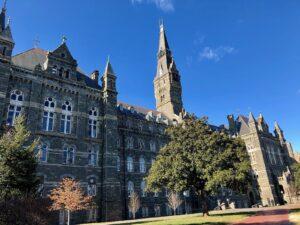Georgetown University announced its recognition of the Black community in the honoring of the 48th annual Black History Month on Feb. 1. This year, the celebration hinges on student engagement, particularly in celebration of this year’s accomplishments furthered by Black student activists and in the continued push for further advances in inclusion and equity on campus.
This year’s celebration includes the recognition of two achievements that the Black Student Alliance (BSA) realized in the past year: the inaugural recognition of Slavery Remembrance Day — a Sept. 10 event which Hoyas Advocating for Slavery Accountability (HASA), the GU Black Leadership Forum (BLF), BSA and the Georgetown University Student Association (GUSA) hosted to honor those who endured slavery — and the opening of a Black affinity space, Blaxa Block.
The BSA hosted its second annual Family Feud event Feb. 1 and will also host Melanin Milestones, an event celebrating Black seniors at Georgetown on Feb. 15 to celebrate Black History Month.
GUSA President and BSA Vice President of Operations Jaden Cobb (CAS ’25) said Black History Month at Georgetown presents both the opportunity to engage with Black culture at large and at the university.
“Celebrating Black History at Georgetown is not only celebrating the historical significance of Blackness in American culture but also celebrating Blackness and its microcosms here at Georgetown,” Cobb told The Hoya.
Nestory Ngolle (CAS ’26) said Slavery Remembrance Day, which honored the 272 men, women and children whom the Jesuits sold in 1838 to keep the university financially afloat, marked a commitment for the university, as a Jesuit institution, to formally confront its history with slavery.
“You always hear about the Catholic Church and slavery, but especially in history classes, that begins to fade,” Ngolle told The Hoya. “But Slavery Remembrance Day highlighted this, which I felt had not been recognized in the past.”

While the university achieved new milestones in 2023 like sending students to Yale’s Black Solidarity Conference — an annual conference that brings students across the country together to discuss the African Diaspora — for the first time in over four years, the university also faced criticism for its inconclusive investigation of a racially motivated hate crime on campus.
In addition to Slavery Remembrance Day, students celebrated the opening of Georgetown’s first Black affinity space, Blaxa Block. The space was one of the demands made by Georgetown Protects Racists (GUPR), a group that emerged in response to the university’s handling of a hate crime that took place in April 2022 .
Ngolle said Blaxa Block fosters a recognition and celebration of the diversity of the Black community at Georgetown.
“There is a very traditional way to conceptualize what it means to be Black, and people tend to categorize us all into one group, but there is an insane amount of diversity in that group,” Ngolle said. “Seeing all those differences meet each other in Blaxa Block is something that I have found to be very beneficial.”
While Black History Month offers a chance to reflect on the accomplishments of the past year, BSA President Aniya Harris (CAS ’24) noted that this celebration of Black History is more than just one month of the year for Georgetown’s Black community.
“Black History Month is every day for me,” Harris told The Hoya. “Every day I wake up Black, and every day I walk in my history, and in the reality of what it means to be Black in this country.”
Harris said she is concerned that the annual acknowledgment of Black History Month is dutiful, but said it nevertheless offers the university a continuous opportunity to acknowledge its history with slavery and discrimination.
“In some ways, it can be performative in how Georgetown acknowledges Black History Month,” Harris said. “My inbox is never as full as it is on February 1st. On the other side, it is a predominately White school. It’s important that we acknowledge this history – it’s important that it is here on this campus.”
Georgetown will also celebrate the 75th anniversary of the matriculation of Samuel Halsey (SFS ’53), its first Black undergraduate student, in 2025.
Melody Emenyonu (SOH ’24) said that the celebration of Black History Month hinges on the will of community members to learn.
“It’s Black History Month, but it’s more of a reminder that we are Black every day,” Emenyonu told The Hoya. “It’s great that we get this celebration once a year, but especially people who are not Black, it is important to have a desire to learn.”
Cobb said Black History Month revolves around meaningfully connecting with Black culture — both within and outside of the community.
“Students should take the time to really conceptualize their place and how their identities, whether they are Black or not, intersect with Black histories and personas during this month,” Cobb said.




















